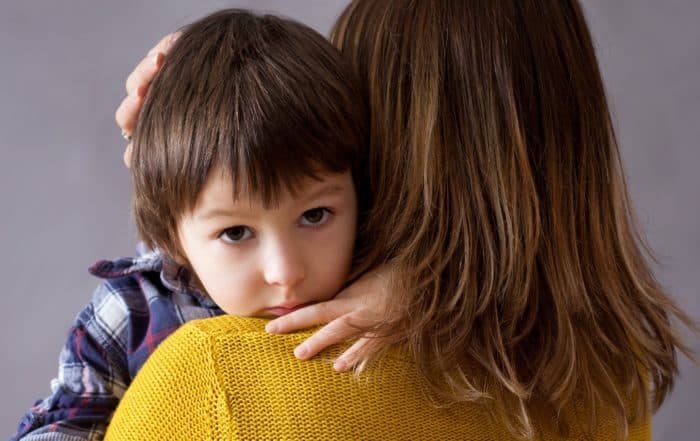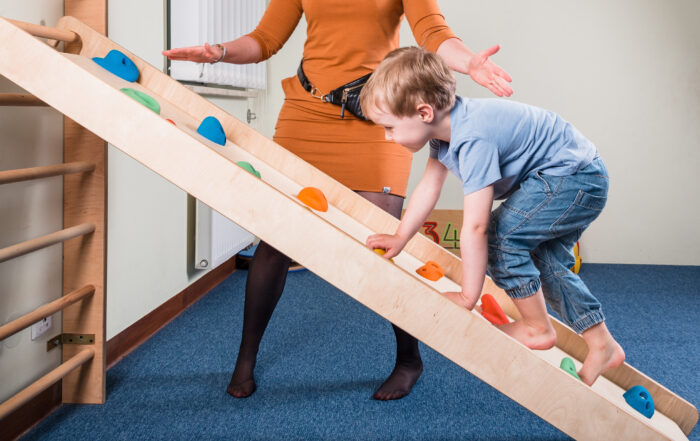The range of autism characteristics varies greatly. One individual may experience mild anxiety or avoid eye contact, whereas another may have much difficulty communicating and engage in severe tantrums. Knowing the common symptoms of autism can be helpful.

What are some Characteristics of Autism?
While autism can only be diagnosed by a healthcare professional, this list of common symptoms associated with autism can help parents and caregivers know what to watch for.
Communication and Social Traits
-
Pragmatic Language – Most individuals on the autism spectrum have difficulty communicating with other people. This often becomes apparent during early childhood. Any delays in speech development and nonverbal communication should be evaluated by a qualified specialist.
-
Eye Contact and Nonverbal Communication – Poor and avoidance of eye contact are common symptoms among those with autism. Other non-verbal communication difficulties may include recognizing and using facial expressions, physical gestures, and overall body language.
-
Tone of Voice – Some people with autism may have difficulty regulating or modulating their tone of voice. As a result, they may speak too loudly, too quietly, and/or with a monotone voice.
Behavioral Traits
-
Repetitive Behaviors – Many people with autism may perform the same behaviors repetitively. This may include rocking, spinning, or flapping of the hands and arms, or flickering their fingers in front of their eyes. They may also play with toys or other objects in unusual ways, such as spinning coins or plates tirelessly and repeatedly flipping light switches.
-
Ritualistic Behaviors – This may include eating the same foods at every meal or watching the same videos over and over again. They may even become quite upset soon after any slight changes in plans.
-
Self-Injury – Some individuals on the autism spectrum bang their head against the ground or wall, bite their hands, or excessively rub or scratch their skin. There are many ways to treat these behaviors including medical, sensory, nutritional, and behavioral approaches. Talk to your doctor as soon as possible if your child engages in any form of self-injurious behavior.
Conditions that can occur with autism
Several medical conditions are associated with autism, and they are often referred to as comorbidities or co-occurring conditions. These can include seizures, sensory sensitivities, anxiety, and sleep disturbances as well as gastrointestinal, metabolic, and immune dysregulation.
Talk with your doctor to identify and treat such conditions.
When do signs of autism appear?
Autism traits in children may be recognized as early as 18 months. More recently, adults are being diagnosed with autism, and this is likely due to increased awareness and screening during medical appointments.
If you suspect that your son or daughter may have autism, it’s time to talk to your doctor. Interventions can make a big difference for both your child’s health and development.
Learn about autism treatments for children and adults.
Blood-brain barrier dysfunction in Pediatric Acute Neuropsychiatric Syndrome (PANS) and Regulation
Free webinar at 1 p.m. Eastern time (US), Wednesday, May 29, 2024 Tune in to learn research updates on blood-brain barrier dysfunction in Pediatric Acute Neuropsychiatric Syndrome (PANS) and
Changes in Autism Symptoms Across Childhood
Free webinar at 1 p.m. Eastern time (US), Wednesday, May 15, 2024 Tune in to this presentation by Dr. Einat Waizbard-Bartov to learn about how autism symptoms change throughout child development.
Motor Skills and Executive Function in Autism
Free webinar at 1 p.m. Eastern time (US), Wednesday, May 8, 2024 Learn about emerging research on the relationship between the development of motor skills and executive function in autistic children.
Autism & Aging – Cognition and Well-being
When we become older, we all hope to become wiser and happier, but we also know that someday we will decline. This decline is apparent in both cognition and
Prevalence of autism in adults increasing rapidly in the U.S.
The prevalence of autism spectrum disorders (ASD) among adults in the United States is rising rapidly, according to a new study. Eric Rubenstein and colleagues analyzed a random sample
Editorial – Addressing delays: proactive parent-led interventions during waiting periods
The wait for an autism diagnosis and subsequent intervention can be highly stressful for many families, especially when access to needed health and educational services also hinges on the approval of







